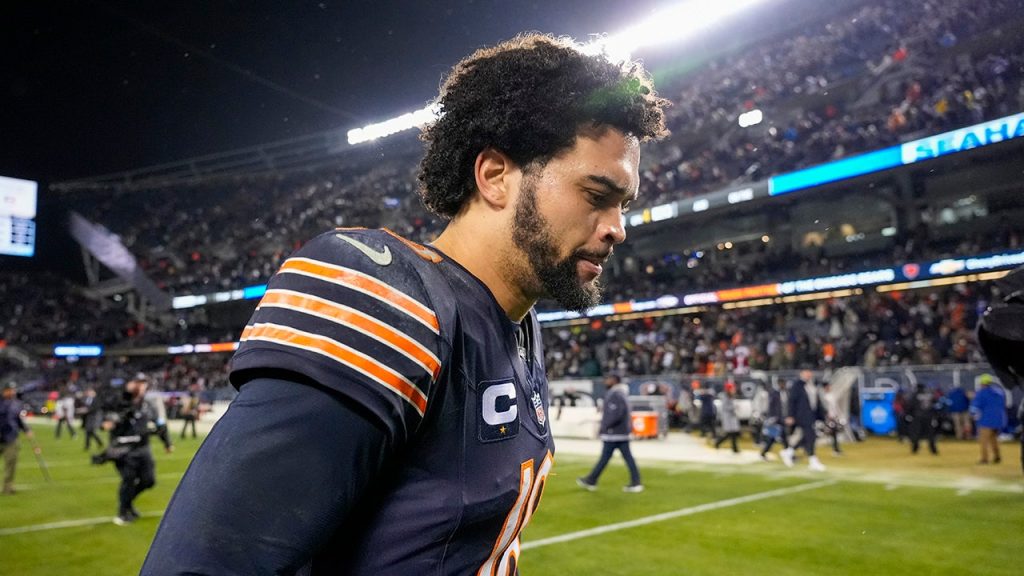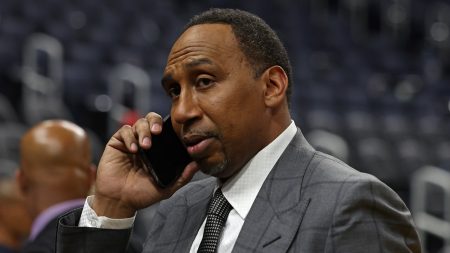The Chicago Bears’ agonizing 6-3 defeat to the Seattle Seahawks on Thursday night, their tenth consecutive loss, ignited a firestorm of discontent among the loyal fans at Soldier Field. Boos rained down upon the team, and chants of “Sell that team” echoed through the stadium, reflecting the deep-seated frustration that has been simmering for years. Rookie quarterback Caleb Williams, the first overall pick in the previous year’s draft, found himself at the center of this storm, bearing the weight of expectations and the fans’ disappointment.
Williams, however, stopped short of taking full responsibility for the team’s woes, acknowledging the historical context of the fans’ frustration. He emphasized that the issues predate his arrival in Chicago, stating, “It’s my first year. Their frustrations go way longer back than I’ve been here.” While understanding the fans’ reactions, he maintained that his focus remained on the field, striving to lead the team to victory. “My job is to go out there and win games,” he asserted, emphasizing the need to tune out external pressures. He adopted a stoic approach, recognizing the fluctuating nature of fan sentiment. “The fans, they’re gonna cheer and maybe boo sometimes, and you can’t react to that. It’s not something that we react to,” he explained.
Despite deflecting overall responsibility for the team’s prolonged struggles, Williams candidly accepted accountability for his subpar performance in the game against Seattle. The Bears’ offense sputtered throughout the night, managing a meager 179 total yards. Williams completed 16 of 28 passes for a mere 122 yards, a performance he deemed insufficient. “I didn’t play well enough,” he admitted. “I didn’t help put the team in a good position to win – a better position to win, and it’s what it is.” This acknowledgment of his individual shortcomings reflects a sense of ownership and a willingness to improve, a crucial quality for a young quarterback facing immense pressure.
The anemic offensive performance against the Seahawks underscores the deeper issues plaguing the Bears. The team’s inability to generate consistent offensive production has been a recurring theme throughout their losing streak. While Williams’ struggles as a rookie quarterback contribute to this problem, the offensive woes extend beyond his individual performance, hinting at systemic issues within the team’s offensive strategy, play-calling, and overall execution.
The fans’ frustration, boiling over into boos and calls for ownership change, reflects not only the immediate pain of a ten-game losing streak but also a deeper disillusionment with the team’s direction. The “Sell that team” chants are a stark expression of lost faith in the current ownership and management, suggesting a desire for a radical shift in leadership to steer the franchise back to competitiveness.
The Bears face a daunting task in their final game of the season, an away matchup against their long-time rivals, the Green Bay Packers. This game, while holding little significance in terms of playoff implications, carries symbolic weight for both the players and the fans. For Williams, it represents a final opportunity to demonstrate growth and resilience, leaving a positive impression as the season concludes. For the fans, it’s a chance to witness a glimmer of hope, a sign that the team is moving in the right direction despite the overwhelming disappointment of the season. The outcome of this game, while not altering the Bears’ dismal record, could significantly impact the morale of the team and the fans heading into the offseason.










